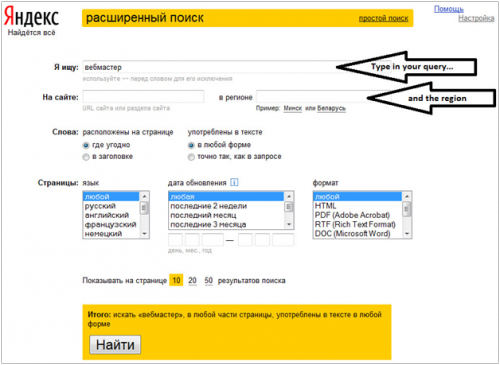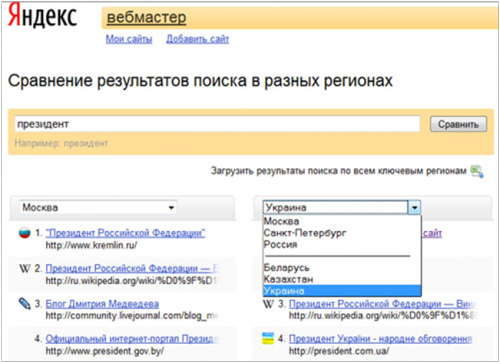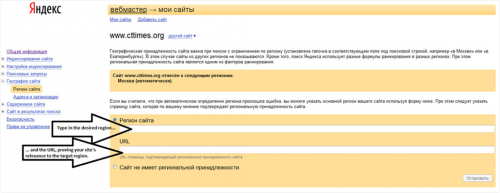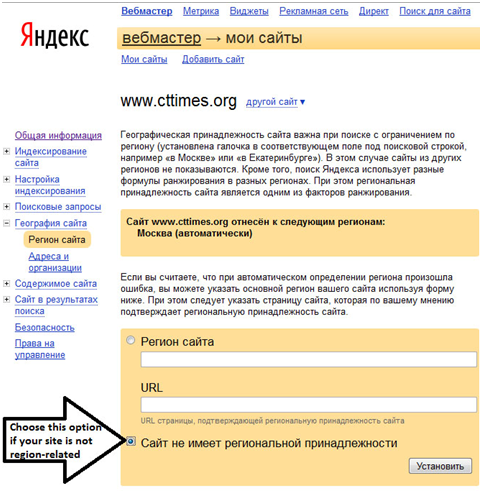Search Marketing Tips For Yandex, Russia’s Top Search Engine
Globally, Russia is the eighth largest market of Internet users, and as we know, Google is playing second fiddle to Yandex, which is currently the main search engine in Russia with well over half of the market share. Yandex makes hundreds of millions of dollars in revenue and provides a broad range of online services […]
Globally, Russia is the eighth largest market of Internet users, and as we know, Google is playing second fiddle to Yandex, which is currently the main search engine in Russia with well over half of the market share.
Yandex makes hundreds of millions of dollars in revenue and provides a broad range of online services (email, free hosting, PPC advertising network (Yandex Direct), maps, news, weather, and dictionaries). Comscore ranked the web property first in Russia with 34.9 million unique visitors in August 2010, It is also the 25th site in the Alexa Top 100. What’s more, Yandex is the default search provider in the Russian version of Firefox.
Russian Language In Connection With SEO
If your company is turning eyes to the Russian market, you might be considering making a Russian-language version of your website to attract more local customers. You could have built your SEO strategy based on your experience in the English-speaking Internet, but if you’re building content in Russian, you should know some basic facts about this language that could influence your SEO strategies.
Most important of the Slavic languages and the fifth most spoken in the world, Russian is used by 275 million people worldwide. That’s quite a lot, and your SEO campaign should be focused on your target audience only.
What is more, Russian is a pretty complex language, with various grammatical phenomena to be conceived. So having a Russian-speaking expert in your SEO team or outsourcing this service is a good solution.
Yandex Ranking Factors
Yandex was designed to handle the semantics of the country’s linguistic system. It has its own algorithm for indexing and ranking websites called Snezhinsk. This algorithm is based on over 1,000 ranking factors, the most important ones being age, unique content and quality backlinks.
Quotation/Citation index
Similar to Google PageRank, Yandex uses its own metric – the Quotation Index (aka Citation Index) – to indicate the site’s trustworthiness, ranging from 0 to 150,000. Trusted, non-public websites in Yandex have values between 150 and 1,000, while leaders of the Yandex Catalogue in the media sector have values up to 20,000. In general, the higher the Quotation Index, the firmer your positions in the Russian site are.
The Quotation Index is determined by the number and quality of your site’s backlinks, with quality being influenced by relevance of the context, geographical location of the linking site and the Quotation Index of your incoming links.
Geo-targeting
Geography is a very important factor for Yandex. All the queries typed by the users in the searchbox are divided into geo-dependent and geo-independent ones.
For example, if someone would search Yandex for a [hairdresser’s] (a geo-dependent keyword) using a Moscow IP, the results will be for that region only. On the contrary, a general query, for instance [download movies], would show results from different regions.
Yandex determines geo-dependence statistically. For instance, the query [cargo transportation] is geo-dependent because according to the statistic it is often accompanied by a certain location. Up to 30 percent of all queries in Yandex are geo-dependent.
How To Check Your Site’s Region In Yandex
Yandex would automatically assign every indexed site with a geographical location according to the location-by-IP data, domain name, contact information (zip code, telephone number) and the content in general.
Currently, Yandex supports 19 regions and 1250 smaller locations – cities and towns. You can check the region your site has been assigned in the Yandex Webmaster section (the service is available in Russian only).
How To Check Your Site’s Positions In Yandex Regions
You can manually compare your site’s ranking for a particular keyword in different regions using Yandex Advanced Search. Type your target location in the region box, go through SERPs and find your site’s position. First choose the advanced search option:
Then type in your query and the region.
There is also a special region-comparing feature in Yandex Webmaster (registration needed). It allows matching the results in two different regions on one page. Convenient enough, this feature has a crucial drawback. It has only six huge regions on the list: Moscow, Saint Petersburg, Russia, Belarus, Kazakhstan, and Ukraine.
If you want to get the region comparison job done faster, you may use our free tool. It lets you check your site’s rankings in several (or all) Yandex regions at once; it also allows you to work with keywords in Russian while using an English interface.
Back to geotargeting – as soon as Yandex crawls your site, it will be assigned with a particular region. If you’re ok with the region your site was assigned – lucky you! But sometimes Yandex gets it wrong and then you might have a hard time getting to rank in the region you want.
What If Your Site Was Assigned The Wrong Region?
In this case, you should request a region change from Yandex Webmaster by indicating a preferred region and providing a URL that proves relevance to that region.
If you have an office in Russia, you can specify its contact information to prove you’re doing business in there.
What If Your Site Should Be Associated With Several Regions?
You can choose up to 7 regions if your website is included in Yandex Catalogue (think DMOZ and Yahoo Directory). Being listed there will boost your Quotation Index and attract visitors.
There are two types of listings in Yandex Catalogue: free and paid (apparently paying raises your chances of inclusion). You can receive a paid listing in a matter of days. However, a site might be rejected due to bad quality. Yandex Catalogue editors are strict! Free listings are a matter of luck. You can apply and wait for several months.
What If You Don’t Want To Be Associated With Any Region?
If you don’t need regional ties, there’s an option for that in Yandex Webmaster.
Yandex Direct: PPC Options
Obviously, optimizing the Russian version of your site in Yandex will require building an efficient keyword list. When creating keyword lists for your American, German or French sites, you turn to Google and Bing for keyword suggestions. But what do you do in Russia?
Yandex has its own PPC service called Yandex Direct which is similar to Google AdWords and Bing’s AdCenter. Yandex PPC does allow phrase and exact match functionality.
Yandex Direct manages PPC campaigns, serving ads on a cost-per-click basis. You decide how much you pay for a click yourself. Minimal bid is 30 kopecks (about a cent), and a minimum order is 300 roubles (about 10 bucks).
Specifying regions for your ads is likely to increase the overall effectiveness of your ad campaign. You can either select several geographical regions or a single one in which you would like your ad to be displayed.
You can check estimated search volume for any keywords/phrases in any region using Yandex Wordstat. It provides keywords suggestions together with monthly search volumes. Unfortunately, you can only enter one seed keyword at a time, so the process of generating a keyword list will take a while.
Recently, Yandex has released an in-depth report on contextual advertising in Russia. The report covers three years, from summer 2007 to summer 2010. For the first six months of 2010, the market share of Yandex Direct was estimated at 75-80%. As of the summer of 2010, ads placed on websites via Yandex Direct were viewed by over 21 million users per day. The fastest growth is observed in Russia’s regions, much higher than in Moscow and Saint Petersburg.
As you see, Yandex is evolving, and it creates brilliant opportunities for running region-targeted campaigns for international companies in Russia and the former Soviet Union. Still find SEO in Russia challenging? Believe us, it’s worth a try!
Contributing authors are invited to create content for Search Engine Land and are chosen for their expertise and contribution to the search community. Our contributors work under the oversight of the editorial staff and contributions are checked for quality and relevance to our readers. The opinions they express are their own.
Related stories




